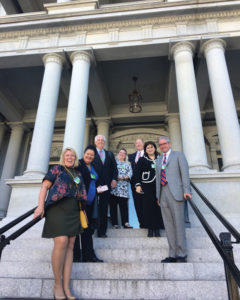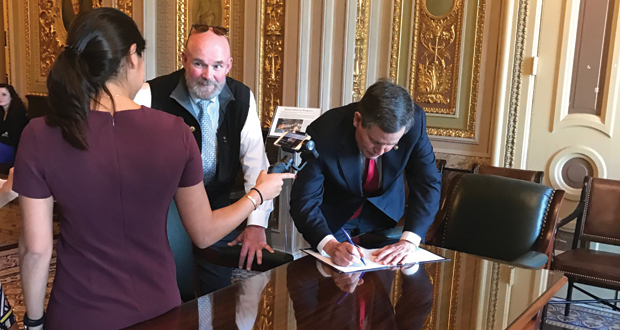The lodging industry is a massive entity. In the United States alone, it represents the employment of more than 8 million people. There are more than 54,200 hotels nationwide, and the industry contributes $590 billion to the U.S. GDP. Given that it is made up of such a large and diverse group of individual hoteliers, frontline workers, and properties, it is pivotal that the industry have advocates who understand the breadth and depth of hospitality as a whole, and work to further its interests.
Since it was founded in 1953, the American Hotel & Lodging Association (AHLA) has made it its mission to serve this purpose. The organization has grown significantly over the past few years—membership is at an all-time high of more than 25,000 lodging properties—and it is in a stronger position than ever before to accomplish its goals.
Top Initiatives
For more than 60 years, AHLA has served as an advocate for the hotel industry. Throughout the decades, its major initiatives have evolved and shifted, but its overall goal has remained constant. “The hotel industry is in the people business—proudly serving our guests and providing lifelong careers and opportunities for the great men and women of hospitality,” Katherine Lugar, president and CEO of AHLA, asserts. “We advocate on behalf of our industry with one unified and powerful voice. Together, we are creating conditions that empower our workforce and lead to greater economic growth across America.” In 2018, AHLA is poised to act on a number of initiatives, some that are focused on the hospitality workforce, and others that involve protecting consumers.

Building at the White House. They were there to
discuss the H2B visa program, which provides
temporary work visas for seasonal foreign workers
in the United States.
Supporting the lodging workforce is especially important to Lugar, who was appointed to the U.S. Department of Labor’s Taskforce on Apprenticeship Expansion last year. “Enrolling new apprentices and expanding the program is critically important to fueling the talent pipeline, which is the backbone of our industry,” she says. “AHLA has committed to the U.S. Department of Labor that we will enroll 2,250 apprentices by 2022. We’re already well on our way and will continue to see progress to this goal this year.”
AHLA also helped get the Save Local Business Act passed in the House of Representatives, which reestablishes the definition of joint employer and protects small business owners and franchises from uncertainty and confusion about whom they employ and are label for. “Today, we are one step closer to this common-sense legislative fix that gives small business owners the clarity and certainty they need,” Lugar says.
Beyond the hospitality workforce, AHLA has numerous consumer protection programs. One of the organization’s top priorities is warning travelers against online booking scams and misleading marketing practices. In June 2017, AHLA launched the “Search Smarter” campaign, which aims to help travelers avoid lost reservations, additional fees, and potentially ruined vacations caused by booking through fraudulent websites. “As online bookings have surged—500 hotels are booked online every minute—so too have online booking scams,” Lugar describes.
Mark Carrier, president of the B.F. Saul Company Hospitality Group and chair of AHLA’s board of directors, says this is a pressing issue for travelers and the hotel industry alike. “Consumers need to be mindful of deceptive practices, which also put hoteliers in a difficult situation. Hotels often don’t have complete data and guests have received inaccurate or contrary information.”
AHLA has partnered with the Better Business Bureau to advance awareness efforts, and continues to urge Congress to support the Stop Online Booking Scams Bill. “As we look to 2018, it remains imperative that we continue to educate members of Congress and make others outside our industry aware of the increased consolidation among the online travel agencies, which limits consumer choice, hurts small business, and can lead to an increase in online deceptive practices,” Carrier adds.
AHLA is also working hard to combat illegal hotels operated through online home-sharing platforms like Airbnb. “Over the past few years, we have made significant strides to advance state and local legislation regulating short-term rentals. In 2018, we will continue to aggressively work around the country to advance laws that level the playing field with full-time commercial operators and combat illegal hotels that threaten the integrity and safety of communities and guests.”
A third guest-focused initiative is acting on hotels’ behalf when state and local governments propose hotel-only workforce initiatives. “Workforce initiatives that target only hotels are unfair and counterproductive. We support policies that treat all workers and businesses equally and fairly, and we will continue working with elected officials and stakeholders to determine the best outcome for our industry and employees,” Lugar says.
Finally, in 2018, AHLA will be working with the broader travel community to ensure the organization is doing all it can to foster travel within and to the United States. Geoff Ballotti, president and CEO of Wyndham Hotel Group, chair of the U.S. Travel Association, and vice chair of AHLA, says this is of the utmost importance to the industry.
“Millions of American jobs and billions of dollars are dependent on international travelers choosing to visit America. In 2016, international visits accounted for 16 percent of total travel spending in the U.S., directly supporting 1.2 million American jobs,” he explains. “But, it also marked the year that, for the first time in a decade, the U.S. lost international inbound market share, leaving America—and American jobs—behind.”
Lugar also notes, “With one in nine jobs depending on travel, we must preserve the economic growth travel brings to communities around the country and grow the number of travelers overall.”
“Together, the travel community must do more to work with Congress and the President to support robust policies that allow secure travel to the U.S.,” says Ballotti. “Last year, international travel generated an $87 billion trade surplus. We can’t afford to fall behind other countries, and now is the time to act and raise our collective voice.
Getting It Done
AHLA’s government affairs team is at the forefront of many of the organization’s initiatives. Brian Crawford, senior vice president and head of government affairs for AHLA, says, “We have a deep bench of talented government affairs professionals at AHLA with extensive experience on Capitol Hill and in federal and state government. They are passionate about our industry, and they are ready to work on behalf of it every day.”
At the moment, Crawford’s team is eager to engage with Congress to advance an agenda that benefits the hotel industry. “Congress works best when it is under deadline pressure. In 2018, Congress will be facing several major deadlines, including budget and appropriations, as well as the Deferred Action for Childhood Arrivals (DACA) program, which ends on March 5,” he maintains, further noting that this should help speed up a Congress that has a reputation for moving slowly.
Crawford also notes that Congress is just one piece of the puzzle. “State and local governments are increasingly important to our business operations. Fortunately, we have strong state associations throughout the country, engaging with those local elected officials to ensure that our industry is being heard,” he explains.
2018 is also an election year, which presents an opportunity for organizations looking to engage with legislators. “Members of Congress spend a lot more time back home in election years, and having hoteliers meet with their elected officials back on their home turf can be invaluable to the work that AHLA does on Capitol Hill.”

How Hoteliers Can Engage
AHLA’s industry initiatives achieve greater success as more hoteliers become involved. “Our industry is at its best when we are all working together to tell our story and engage our elected officials,” Crawford says.
Lugar agrees. “Hotels are woven into the fabric of every community across America. Our commitment to our guests, our workforce, and our communities makes us a powerful voice. Hoteliers must be willing to stand up and advocate for policies that will help us do more,” she says.
Crawford encourages advocacy-minded hoteliers to sign up for HotelsACT. Members of this grassroots effort receive regular updates on issues affecting the industry, as well as tools that help them connect with elected officials.
Top photo: Hoteliers and legislators met to discuss industry issues at the 2017 Legislative Action Summit in Washington, D.C.










